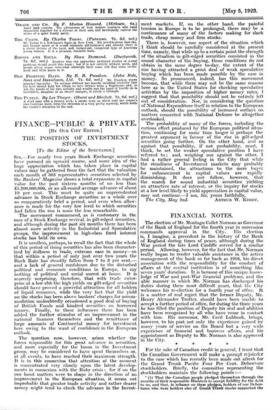FINANCE-PUBLIC & PRIVATE.
[BY OUR CITY EDITOR.]
THE POSITION OF INVESTMENT STOCKS.
[To the Editor of the SPECTATOR.] SIR,—For nearly two years Stock Exchange securities have pursued an upward course, and some idea of the huge appreciation which has taken place in capital values may be gathered from the fact that the valuation each month of 865 representative securities selected by the Bankers' Magazine shows a total expansion in capital value for the past sixteen months of no less than £1,200,000,000, or an all-round average advance of about 19 per cent. This must be quite an unprecedented advance in Stock Exchange securities as a whole over so comparatively brief a period, and even when allow- ance is made for the very low level to which securities had fallen the rise is none the less remarkable.
The movement commenced, as is customary in the case of a Stock Exchange revival, in gilt-edged securities, and although during the past six months there has been almost more activity in the Industrial and Speculative groups, the improvement in high-class fixed interest stocks has held its own.
It is needless perhaps, to recall the fact that the whole of this period of rising securities has also been character- ized by dullness in trade, extreme ease in money—so that within a period of only just over two years the Bank Rate has steadily fallen from 7 to 8 per cent.— and a lack of general confidence due to the disturbed political and economic conditions in Europe, to say nothing of political and social unrest at home. It is scarcely surprising, therefore, that with trade enter- prise at a low ebb the high yields on gilt-edged securities should have proved a powerful attraction for all holders of liquid resources, while the very fact that the yield on the stocks has been above bankers' charges for accom- modation undoubtedly oecasioned a good deal of buying of British Funds and kindred securities on borrowed money. Finally, to these influences there has been added the further stimulus of an improvement in the national finances themselves and the remittance of large amounts of Continental money for investment here owing to the want of confidence in the European outlook.
The question now, however, arises whether the forces responsible for this great advance in securities, and more especially for the boom in the Investment group, may be considered to have spent themselves or, at all events, to have reached their maximum strength. It is in this connexion that attention at the moment is concentrated very closely upon the latest develop- ments in connexion with the Ruhr crisis ; for if on the one hand matters were to shape in the direction of an improvement in the European situation, it seems not improbable that greater trade activity and rather dearer money might tend to check the advance in the Invest- ment markets. If, on the other hand, the painful tension in Europe is to be prolonged, there may be a continuance of many of the factors making for slack trade, cheap money and firm stocks.
There is, however, one aspect of the situation which I think should be carefully considered at the present time, namely, that while up to a certain point the strength of the situation in gilt-edged securities consisted in the sound character of the buying, those conditions do not obtain in the same degree to-day, the extent of the rise having attracted a great deal of weak speculative buying which has been made possible by the ease in money. So pronounced, indeed, has this movement become, that while there may not be the same reasons here as in the United States for checking speculative activities by the imposition of higher money rates, I suggest that that possibility should not be entirely left out of consideration. Nor, in considering the question of National Expenditure itself in relation to the European outlook, should the possibility of increased outlays on matters connected with National Defence be altogether overlooked.
The probability of many of the forces, including the curious effect produced by the European political situa- tion, continuing for some time longer is perhaps the greatest argument in favour of the rise in gilt-edged securities going further. On the other hand, and as against that possibility, if not probability, must, I think, be set the weaker speculative position I have referred to ; and, weighing one against the other, I find a rather general feeling in the City that while the steadiness of Investment markets may probably be maintained, the attractions to the mere buyer for enhancement in capital values are rapidly diminishing. It does not follow, however, that the search for sound industrial securities yielding an attractive rate of interest, or the inquiry for stocks at a low level likely to yield appreciation in capital value, may not continue.—I am, Sir, yours faithfully,














































 Previous page
Previous page